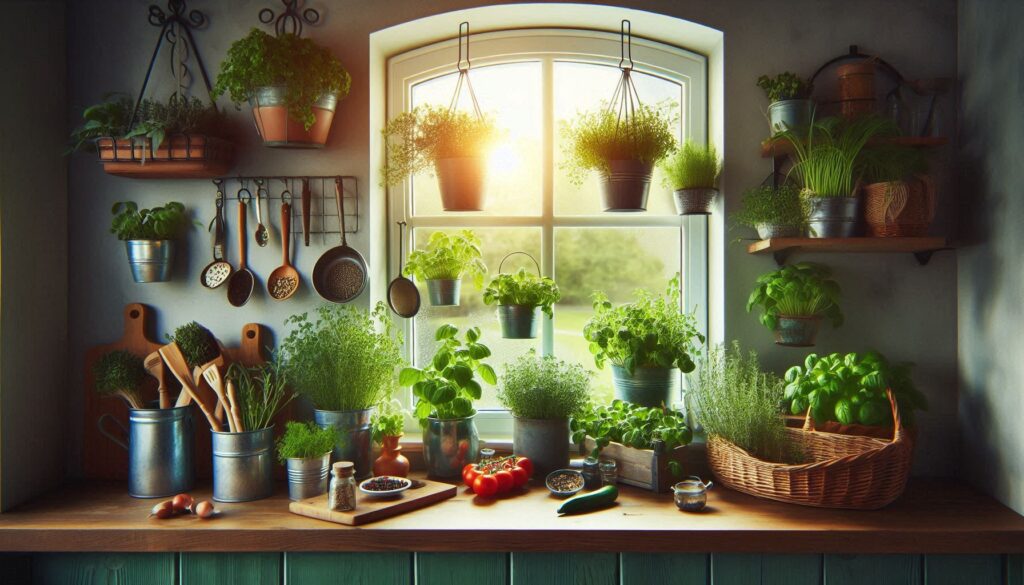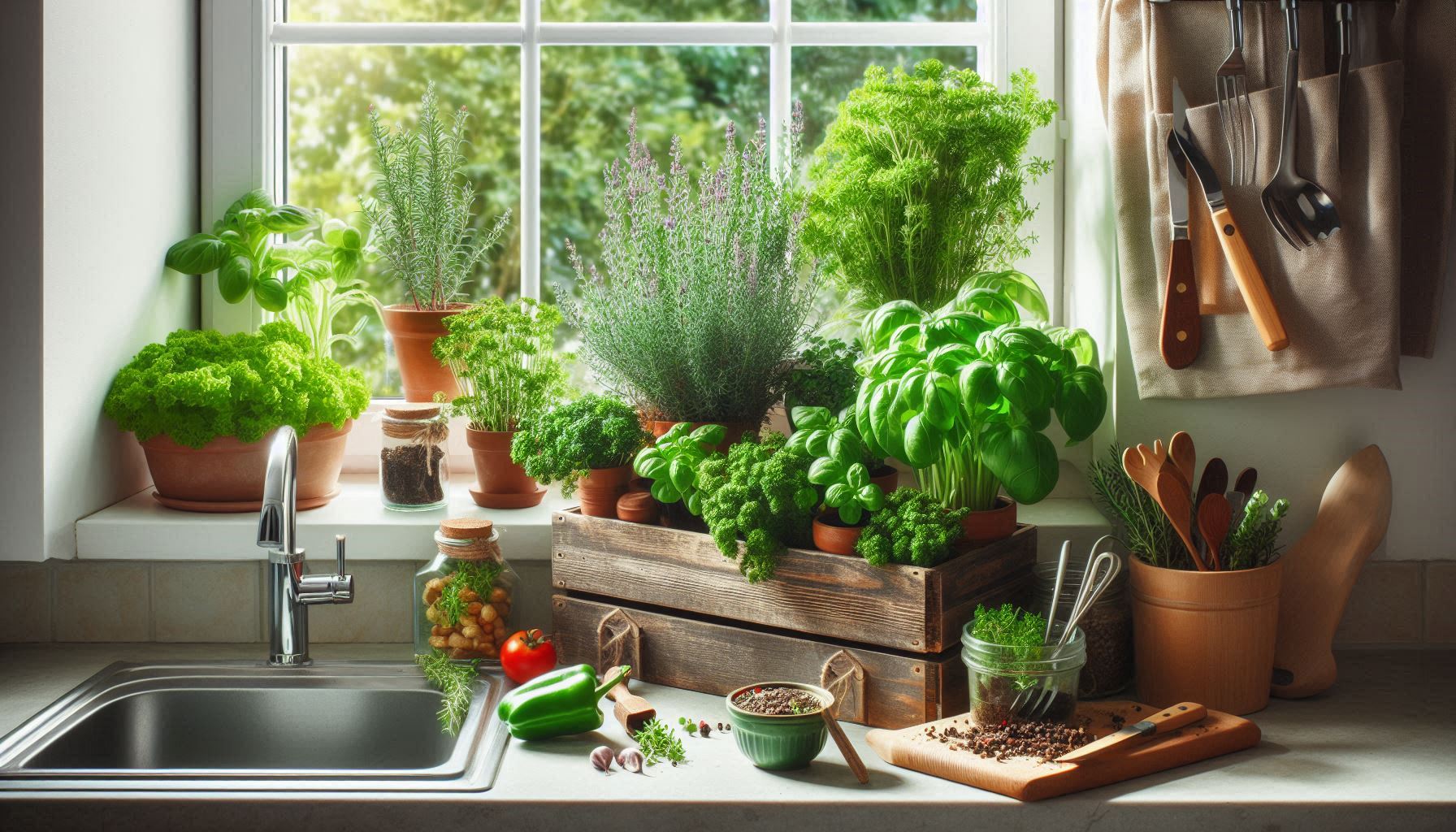In the realm of culinary delight and home gardening, few things rival the charm and practicality of an herb windowsill garden. Imagine stepping into your kitchen, reaching out to pluck fresh basil leaves for a Caprese salad, or snipping some fragrant rosemary to season a roast chicken. This is the essence of an herb windowsill garden—an accessible, aromatic oasis that brings nature’s bounty directly to your cooking space.
Why Choose an Herb Windowsill Garden?
1. Convenience and Accessibility:
Having fresh herbs within arm’s reach while cooking is not only convenient but also ensures that you use them at their peak flavor. No more last-minute trips to the store for expensive, packaged herbs that often wilt before you can use them.
2. Cost-Effective:
Growing your own herbs is a cost-effective alternative to buying them regularly. Once established, herb plants require minimal maintenance and can provide an abundant harvest throughout the growing season.
3. Flavor and Freshness:
There’s no comparison between the taste of freshly harvested herbs and those that have been sitting on supermarket shelves for days. Herbs grown at home retain their essential oils and flavors, enhancing the taste of your dishes.
4. Aesthetic Appeal:
An herb windowsill garden adds a touch of greenery and natural beauty to your kitchen. It can transform a mundane space into a vibrant, inviting culinary haven.
5. Educational Opportunity:
Growing herbs provides an excellent opportunity to learn about gardening, plant care, and the culinary uses of different herbs. It’s a rewarding experience that can deepen your connection with food and nature.

Choosing Herbs for Your Windowsill Garden
When selecting herbs for your windowsill garden, consider your culinary preferences, available space, and growing conditions. Here are some popular herbs that thrive indoors:
- Basil: Known for its sweet aroma and versatile culinary uses, basil is a must-have in any herb garden. It prefers bright, indirect light and well-draining soil.
- Rosemary: With its robust flavor and pine-like fragrance, rosemary is perfect for seasoning meats, potatoes, and roasted vegetables. It thrives in bright light and requires moderate watering.
- Thyme: This herb adds a subtle, earthy flavor to soups, stews, and sauces. Thyme prefers a sunny location and well-drained soil.
- Mint: Refreshing and aromatic, mint is ideal for teas, cocktails, and desserts. It grows vigorously and prefers moist soil and partial shade.
- Parsley: A staple in many dishes, parsley adds freshness and color. It grows well in bright, indirect light and likes consistently moist soil.
- Chives: These mild, onion-flavored herbs are excellent for garnishing salads, soups, and omelets. Chives thrive in sunny locations with well-draining soil.
Setting Up Your Herb Windowsill Garden
1. Choose the Right Location:
Select a south-facing or west-facing windowsill that receives at least 4-6 hours of sunlight per day. Herbs need ample light to thrive indoors.
2. Container Selection:
Use containers with drainage holes to prevent waterlogged soil, which can lead to root rot. Terra cotta pots or ceramic containers are popular choices for herb gardening.
3. Potting Mix:
Use a well-draining potting mix formulated for herbs or mix your own using equal parts potting soil, perlite, and coarse sand.
4. Planting and Watering:
Plant your herbs at the same depth they were in their nursery pots, ensuring the roots are covered with soil. Water thoroughly but allow the soil to dry out slightly between waterings to prevent overwatering.
5. Maintenance:
Trim herbs regularly to promote bushy growth and prevent them from becoming leggy. Pinch off flowers as they appear to encourage continued leaf production.
6. Fertilization:
Feed your herbs with a diluted liquid fertilizer every 4-6 weeks during the growing season to provide essential nutrients.
Caring for Your Herb Windowsill Garden
Maintaining a thriving herb windowsill garden requires attention to the specific needs of each herb. Here are some essential care tips:
- Light Requirements: Monitor the amount of sunlight your herbs receive daily. Rotate pots occasionally to ensure even growth.
- Watering: Check the soil moisture regularly. Water when the top inch of soil feels dry, and water thoroughly until it drains from the bottom of the pot.
- Temperature and Humidity: Most herbs prefer room temperatures between 60-75°F (15-24°C) and moderate humidity levels. Avoid placing them near drafts or heat sources.
- Pest Control: Inspect your herbs regularly for pests such as aphids or spider mites. Use organic pest control methods if necessary, such as insecticidal soap or neem oil.
- Harvesting: Harvest herbs in the morning when their essential oils are most concentrated. Use sharp scissors or pruning shears to snip stems just above a pair of leaves.
Enhancing Your Culinary Experience
An herb windowsill garden not only provides fresh ingredients for your culinary creations but also enhances your cooking experience in numerous ways:
- Experimentation: Explore new flavors and culinary combinations by incorporating fresh herbs into your favorite recipes.
- Health Benefits: Many herbs offer health benefits beyond their culinary uses, such as antioxidant properties or digestive aid.
- Seasonal Enjoyment: Enjoy herbs year-round, regardless of the season, by growing them indoors.
Creating an herb windowsill garden is a delightful journey into the world of gardening and culinary arts. Whether you’re a seasoned chef or a novice cook, growing herbs at home offers a rewarding experience that connects you with nature and enhances the flavor of your dishes. By choosing the right herbs, providing proper care, and incorporating them into your cooking routine, you can enjoy the freshness and aroma of homegrown herbs every day. Embrace the opportunity to cultivate your own mini-garden on your windowsill and savor the joy of harvesting and using herbs that you’ve nurtured with care.

